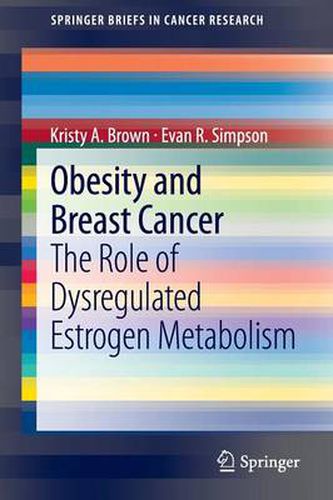Obesity and Breast Cancer: The Role of Dysregulated Estrogen Metabolism
Kristy A. Brown,Evan R. Simpson

Obesity and Breast Cancer: The Role of Dysregulated Estrogen Metabolism
Kristy A. Brown,Evan R. Simpson
This title is printed to order. This book may have been self-published. If so, we cannot guarantee the quality of the content. In the main most books will have gone through the editing process however some may not. We therefore suggest that you be aware of this before ordering this book. If in doubt check either the author or publisher’s details as we are unable to accept any returns unless they are faulty. Please contact us if you have any questions.
Obesity is a risk factor for breast cancer in older women. A number of adipose-derived and obesity-related factors have been shown to affect tumour cell growth. These include adipokines, insulin, IGF-1 and oestrogens. The majority of obesity-related postmenopausal breast cancers are oestrogen-dependent. Since the ovaries no longer produce oestrogens after menopause, and that circulating levels are negligible, it is evident that it is the oestrogens produced locally within the breast adipose that are responsible for the increased growth of breast cancer cells. Aromatase is the enzyme that converts androgens into oestrogens and its regulation is dependent on the activity of a number of tissue-specific promoters. Targeting oestrogen biosynthesis in obesity may be useful for the prevention of breast cancer. Aromatase inhibitors are efficacious at treating postmenopausal breast cancer and recent studies suggest that they may also be useful in the prevention setting. However, these compounds inhibit the catalytic activity of aromatase and as a consequence lead to a number of undesirable side-effects, including arthralgia and possible cognitive defects due to inhibition of aromatase in the bone and brain, respectively. Novel therapies, such as those employed to treat obesity-associated disease, including anti-diabetics, may prove successful at inhibiting aromatase specifically within the breast. This SpringerBrief will explore all of these issues in depth and the authors are in a unique position to write about this topic, having extensive experience in the field of aromatase research.
This item is not currently in-stock. It can be ordered online and is expected to ship in 7-14 days
Our stock data is updated periodically, and availability may change throughout the day for in-demand items. Please call the relevant shop for the most current stock information. Prices are subject to change without notice.
Sign in or become a Readings Member to add this title to a wishlist.

